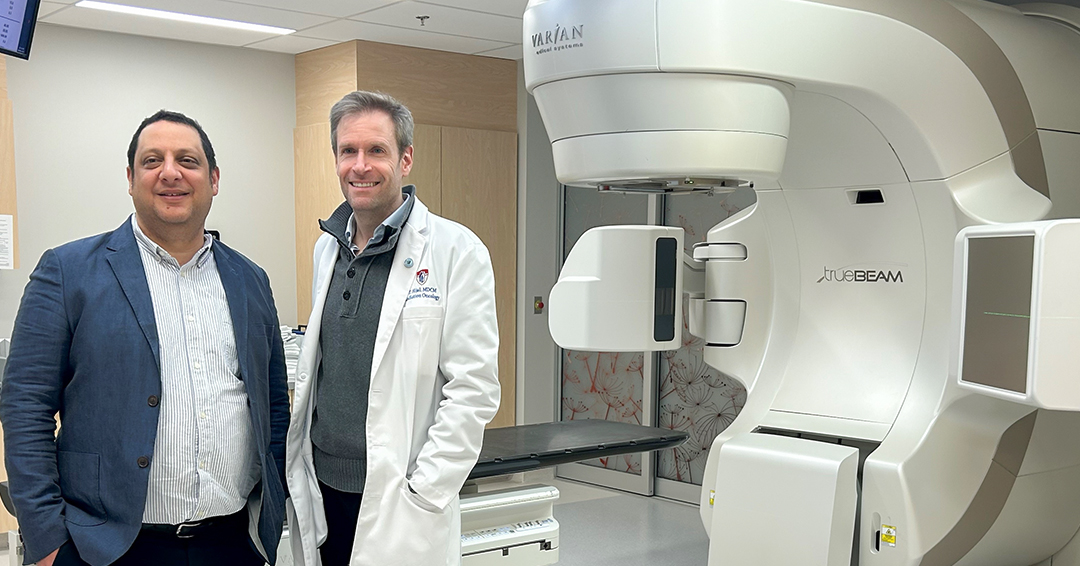
Treating without surgery: the ultimate goal that radiation oncologists at the MUHC and HMR hope to achieve
A patient diagnosed with grade 1 or 2 breast cancer usually undergoes surgery, followed by daily radiotherapy sessions starting a month later. In addition to requiring between 5 and 20 hospital visits, depending on each hospital’s protocol, these treatments leave marks on the irradiated area, which can become harder, shrink or deform.
Tarek Hijal, MD, from the McGill University Health Centre (MUHC) and Michael Yassa, MD, from Maisonneuve-Rosemont Hospital (HMR), have pioneered a new strategy to reduce treatment duration, hospital visits, side effects and improve cosmetic outcomes. In this approach, eligible patients receive a single dose of radiation therapy before surgery. Tested in two clinical trials involving women over 60 with low-risk breast cancer, the strategy yielded positive results, which were published in Radiotherapy and Oncology (the Green Journal) in September 2024. A third trial is currently underway, tracking patients for one year post-radiotherapy to assess if the tumour has shrunk enough to avoid surgery or enable a less invasive procedure.
“Our results are guiding the development of a fairly revolutionary protocol,” says Dr. Hijal, radiation oncologist, investigator in the Cancer Research Program of the Research Institute of the MUHC (The Institute), and director of the Department of Radiation Oncology at the MUHC. It will take more time and larger studies to confirm the results in the longer term, but based on the encouraging results already obtained, we are hopeful that we will be able to reduce the number of treatments and improve cosmetic outcomes for women with low-risk breast cancer.”
“Our approach could reduce the need for longer treatments or more invasive surgery, while being more convenient for patients, especially those living in regions far from treatment centres. All this with the double benefit of reducing the burden on the health system,” adds Prof. Yassa, a radiation oncologist at the Maisonneuve-Rosemont Hospital and a researcher at the Maisonneuve-Rosemont Hospital Research Centre.
Indeed, reducing treatment duration and the need for surgery for new breast cancer diagnoses—which could have affected more than 30,000 women in Canada in 2024, according to the Canadian Cancer Society—would not only improve the experience of those undergoing treatment, but also reduce the burden on a healthcare system already struggling to meet the surgical needs of the population.
About the studies
SPORT-CK trial, conducted at the MUHC between October 2016 and July 2022
- 25 patients aged 60 and over with low-risk breast cancer (grades 1–2, ER+, Her2-; median age 67 years) received a single dose of preoperative radiotherapy followed by surgery within 72 hours. The median follow-up for patients was 60 months.
- Results:
- No major surgical complications, minimal side effects, and a good cosmetic result for almost all patients.
- No cases of recurrence have been observed after five years. Additional studies are needed to confirm these long-term results.
- Reference: Dima Mahmoud, Michael Yassa, Leticia Alvarado, Christine Lambert, Sarkis Meterissian, Dawn Anderson, Francine Tremblay, Naim Otaky, John Keyserlingk, Valerie Panet-Raymond, Neil Kopek, Marc David, Marie Duclos, Catherine Pembroke, David Fleiszer, Ari N Meguerditchian, Antoine Loutfi, Danny Lavigne, Tarek Hijal, Single pre-operative radiation therapy (SPORT-CK) trial for low-risk breast cancer: Early results of a phase 2 study, Radiotherapy and Oncology, Volume 200, 2024, 110510, ISSN 0167–8140.
https://doi.org/10.1016/j.radonc.2024.110510
SPORT-DS trial, conducted at the HMR between June 2018 and December 2019
- 13 patients aged 65 and over with low-risk breast cancer (grade 1–2, ER+, Her2-; median age 71) received a single dose of preoperative radiotherapy followed by surgery three months later. The median follow-up for patients was 48.5 months.
- Results:
- 85% of patients saw their tumours shrink, with minimal side effects such as mild skin reactions and breast pain.
- One patient had a complete disappearance of the tumour.
- After three years, 60% of patients rated their cosmetic result as good or excellent.
- The timing of the surgery was not considered optimal, due to the inflammation-caused by the radiotherapy—that was present at the time.
- Reference: Danny Lavigne, Tarek Hijal, Peter Vavassis, Marie-Christine Guilbert, Lucas Sideris, Pierre Dubé, Mai-Kim Gervais, Guy Leblanc, Michel-Pierre Dufresne, David Nguyen, David Tiberi, Dima Mahmoud, Michael Yassa, Single preoperative radiation therapy with delayed surgery for low-risk breast cancer: Oncologic outcome, toxicity and cosmesis of the SPORT-DS phase I trial, Radiotherapy and Oncology, Volume 200, 2024, 110515, ISSN 0167–8140.
https://doi.org/10.1016/j.radonc.2024.110515
